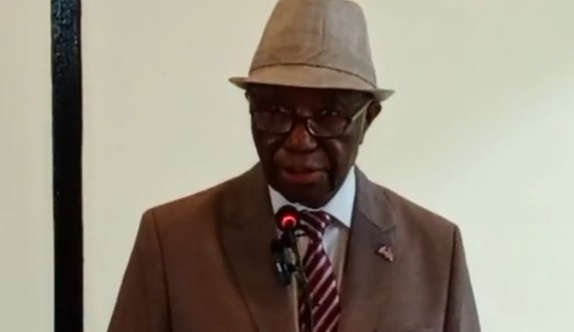Liberia is witnessing a troubling decline in the rule of law, as lawmakers blatantly disregard the Constitution while the President remains passive, leaving citizens vulnerable to the whims of legislators who increasingly resemble gangsters. This alarming situation has escalated as a faction of lawmakers, seemingly supported by President Joseph Boakai and identifying themselves as the “Majority Bloc,” attempts to oust House Speaker Cllr. Jonathan Fonati Koffa. The Liberian government continues to deny that it is sponsoring Koffa’s ouster.
For nearly three weeks, the House of Representatives has been engulfed in chaos, with no apparent effort from President Boakai to restore order. The unrest poses a significant risk of spreading throughout the country, threatening stability and governance.
According to the Liberian Constitution, a two-thirds majority—49 of the 73 lawmakers—is required to remove the Speaker. However, the dissenting lawmakers have yet to reach this threshold, while Speaker Koffa struggles to secure the 37 votes necessary to conduct business effectively. Interestingly, the rebellious faction has refused to acknowledge the authority of the Speaker, opting instead to hold separate sessions, further deepening the crisis.
To add insult to injury, the Boakai administration appears to support the rebel lawmakers under the pretense that they are the majority. Although the Boakai government has denied taking sides, its actions have clearly favored the rebellious lawmakers. President Boakai has allowed his nephew, Minister of Internal Affairs Francis Nyemadie, Water and Sewer Corporation head Mohammed Amie, and Transport Minister Tyler to appear before this illegal group. This political turmoil not only undermines the legislative process but also jeopardizes the democratic principles upon which Liberia was built. As the standoff continues, the need for decisive leadership and adherence to constitutional mandates has never been more critical. Boakai’s maneuvers in the lower house of the national legislature could ultimately backfire.
Turmoil in the Liberian House of Representatives escalated further on Tuesday as lawmakers clashed over control of the joint chambers. Tensions reached a peak as lawmakers from opposing factions confronted each other over the use of these chambers. The confrontation arose primarily from a group of rebellious lawmakers seeking to oust the House Speaker, leading to chaos and disorder within the legislative body.
Witnesses reported that the situation became increasingly heated as members of the opposing factions scrambled for control of the joint chambers, resulting in a physical altercation. The clash saw chairs being broken and other property damaged, highlighting the growing unrest among lawmakers. This unrest has the potential to spill over into the streets and other parts of the country.
In response to the escalating violence, police were summoned to the scene in an attempt to restore order. However, their intervention was met with criticism, as many accused the officers of siding with the rebellious lawmakers, further inflaming tensions between the factions. “This is an unfortunate situation that should never have escalated to this level,” stated one lawmaker, emphasizing the need for dialogue and resolution within the House. Another representative condemned the actions of both the rebellious lawmakers and the police, calling for accountability and a return to civility in governance.
As the dust settles on this tumultuous episode, the future of the House Speaker—and indeed the stability of the House—remains uncertain. Lawmakers now face the challenge of reconciling their differences and restoring order to a legislative body that is crucial for the governance of Liberia. The Speaker is backed by the Constitution, while the rebellious lawmakers are attempting to coerce him into resignation under pressure. However, Speaker Cllr. Fonati Koffa has stated that resignation is not an option.
The incident has raised questions about the integrity of the legislative process and the role of law enforcement in maintaining peace within political institutions. As investigations continue, the eyes of the nation are on the House of Representatives to see how they will navigate this crisis, prevent further disruptions in the future, and how President Boakai will conduct himself—not just as a president but as a senior statesman who should rule by the Constitution. Allowing his cabinet to lend credence to lawlessness implies that he has given his approval to the rebellious faction.
When a sitting president causes a situation that stalls the work of the House of Representatives, several consequences can arise:
- Legislative Gridlock: The most immediate effect is legislative gridlock, where the House is unable to pass laws or address key issues due to political disagreements or strategic stalemates.
- Political Tension: The relationship between the executive and legislative branches may become strained, leading to increased partisanship and conflict. This tension can affect future cooperation on bipartisan issues.
- Public Discontent: Citizens may express frustration with both the president and Congress, leading to decreased approval ratings for both parties. This public discontent can influence future elections and political dynamics.
- Impact on Policy: Critical issues, such as budget approvals and healthcare, may be delayed or neglected, which can have real-world consequences for citizens relying on government services.
- Potential for Impeachment: In extreme cases, if the president is believed to be stalling legislative work for personal gain or misconduct, it could lead to impeachment proceedings, further deepening the political crisis.
- Judicial Involvement: If the situation escalates, it may lead to legal challenges where courts might be called to interpret the limits of executive power and legislative authority.
Overall, the consequences can significantly affect governance, policy-making, and the overall health of the political system, and possibly lead to state collapse.








